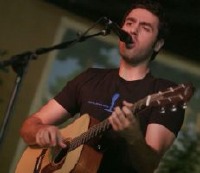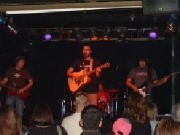|
|
|
Ari Hest |
|
After working for years as an independent musician, Ari Hest is immersing himself into the life of a major label artist. Offering support to such acts as O.A.R., Vanessa Carleton and Edwin McCain, Hest has appeared in front of thousands of new faces in 2004 and 2005 making fans across the country as a result. A spot on Last Call with Carson Daly didnít hurt, either. Itís his lush baritone voice and soulful lyrics that draw people to Hest, and his endearing personality keeps them coming back for more. During a recent tour stop, Hest chatted with Way Cool Music about his fans, his love of sports, and the joy of leprechauns. |
|
|
Way Cool: |
Tell us a little about your music background. |
| |
|
| Ari Hest: |
I started taking piano lessons when I was 7 or 8 years old for two years. My teacher was probably really good, but also very old, so I didnít think it was cool. I didnít do that for very long. I played clarinet because my father told me it would be a good idea. That lasted for about a year. My teacher was mean in that case, so I didnít do that very long either. Then I joined a choir in high school and just started singing Mozartís Requiem and a lot of traditional choral pieces, most of which I was indifferent about, but some of them I really enjoyed. I realized at that point the music was more than just a passing phase. I didnít know I had any talent until that point. With Mozartís Requiem, I learned it so well and was singing the soprano and alto parts because I just remembered them. If someone was out of the alto class for that day, my teacher would ask me to switch to go there.
|
|
 |
| |
|
| |
I didnít know what to make of it, but I knew I had some sort of talent. I did a Battle of the Bands when I was in 11th grade. After three months of playing guitar, my friend, Ken, who was a big Smashing Pumpkins and Pearl Jam fan, and I did the talent show. We did a Zeppelin song, a Pumpkins song, and Pearl Jam as a set ender. And we lost! We got second place because a math teacher at the school did a really good Axel Rose impersonation. He was one of two teachers who competed. It was a charity event, so they were allowed to join. He was unstoppable! It was cool to see the teacher up there doing that. But, he won, which sucked for me.
So, then I went to college and kept playing guitar. I formed a band with some guys back in New York. I was migrating between Cornell University (in Ithaca) and New York for two years. I used to come home on weekends to play. It was a good experience. I got to see what being in a band was like and see how different personalities fit together and if it was possible for it to work. In that case, we all kind of agreed after a year or so that it wasnít working for a lot of reasons. I also wrote a few songs in that band and decided to keep playing. I found a couple of coffeehouses near NYU, where I transferred halfway through college, and started playing to family and friends. Eventually a few other people trickled in. |
|
|
WC: |
What kind of adjustments have you had to make from being an independent artist to being on a major label (Columbia)? |
|
|
| AH: |
Not a whole lot. The biggest adjustment is completely mental; itís thinking of yourself as a business. I guess I did that a little bit when I was independent, but I wasnít thinking about it as much as I am now. There are so many jobs riding on my shoulders now. I try not to think about it that way, but itís hard to ignore it. Thereís an A&R guy who signed me to the label, and if it doesnít work out, that guyís probably going to go. Thatís why the life span of those guys is usually less than a year. You sign someone and it doesnít work out, ďBye, bye!Ē
The whole selling records thing? Yeah, I think about it. I wish I didnít think about it as much as I do. I do think about the music first, which is the most important thing, but thereís more to the whole game now. Itís not all just fun. Itís a little more of a grind, I guess. |
|
|
WC: |
Whatís been the biggest payoff for you? |
|
|
| AH: |
I get free clothes when we do clothing shoots. My recordís in some stores across the country, which is also nice. I probably could have done that independently too, but it would have been really hard. My brother (Danny, manager) and I expended so much energy to get where we did and we just got tired of doing everything. We needed help at that point. The radio team hasnít really kicked in yet, but it will in the future. Thatís something that we needed help with. These days, major label artists are looked at as the way to go for radio stations, at least major radio stations. They are more interested in music that they get shipped by Columbia or Universal instead of listening to the guy down the street who could very well be awesome. Thatís kinda scary to think about. Occasionally thereís a station thatís good to everybody, but thatís rare. I would like it if any radio station played my song! To this point, itís been OK, but I think it will get better. |
|
|
| WC: |
Whatís it like to have your brother, Danny, as your manager? |
| |
|
AH: |

|
|
|
Itís fun, but itís difficult as well. It depends on the hour; it depends on the day. We talk 20 times a day and one of them is about, ďHey, how are you doing?Ē The rest is where to be when, and how much time weíll be playing for, or whatever other business that has to be covered. Itís also taking directions from him, knowing that when we were younger, I wouldnít do that and he would beat me up or something. Now that doesnít happen, but thereís a little bit of, ďI have to listen to my brother? I donít want to do that.Ē But, heís very good at what he does and heís a huge part of where I am at this point. |
|
|
|
| WC: |
Is there anything that you think major labels should learn from independent artists? |
|
|
| AH: |
Up to this point, Columbia has done what I wanted them to do, which is basically to leave me alone. They let me make the record and there wasnít a guy telling me, ďI donít think that song is right for the album.Ē There wasnít that guy. For a radio single, they may want a remix, and thatís OK, but I have the final say. That part is the most important.
Thereís a lot they can learn from bands like Guster and Dispatch. Any independent band that has success did it on their own. There were secrets that they have that shouldnít be secrets. Labels should realize that itís important to have a rep team. In a sense that these bands, including me, made their own labels. As for reps, they didnít get paid to work for me, but they got perks including going to shows for free. They were part of the label. They didnít have designations as such, but thatís essentially what they were. We had our own mini label and it was working. What ends up happening to a lot of artists is that thereís a group of maybe 15 people at the label working on your behalf. If thereís one downer in the whole group, then it can be bad news. Everything has to be working for it to go where you want it to go. Itís a little more difficult now because I have to rely on people that I either didnít choose or donít know how to connect with. They may have other artists and need to work really hard with them.
But, itís too early to say whether I like it or donít like it. I know that I made the decision I wanted to make and Iím happy about that. I needed to try this out and felt that I was young enough to do it. Iím 25, letís try it! If it doesnít work out, then Iím 27 or 28 and I can go back to doing my own thing or join another label. |
|
|
| WC: |
What has been the response of your fans about you joining a label? |
|
|
| AH: |
Mostly positive. Most of them understand that it was something I wanted to do. They respect that, even if they donít like the whole major label thing. Most of them are cool about it. Occasionally there are people who say, ďI wish you were playing your guitar in a coffee shop again.Ē I understand. I feel what theyíre saying. But, I havenít had someone say, ďIím not going to be your fan any more.Ē And thatís a testament to how great my fans are. They are smart people and they understand. They enjoy what I do and let me do what I want to do. Theyíre still going to like it. So, things havenít really changed since I got on Columbia. I donít see any reason why they should be bugged out by it at this point. |
|
|
| WC: |
Well, in two years when youíre rich and famous, they can call you a sell-out! |
|
|
| AH: |
That term is so bogus. Occasionally it makes sense, but itís so rare that it does. So many people get labeled as sell-outs who just arenít. They get stuck in a situation they canít get out of and they go with it. Or they were doing what they wanted to do all along and their fans didnít want it. Too bad! As an artist, this is what I want to do and, like I said, the majority of my fans have been really supportive. |
|
 |
|
|
| WC: |
Fans can get a little protective of someone that they feel they helped further that career, or that itís their secret. |
|
|
| AH: |
Right! I get that. I understand that. Itís just one of those things that I canít help. As I get bigger, I just hope they stay with me. |
|
|
| WC: |
Youíve been touring constantly. What has that done for your career and personal life? |
|
|
AH: |
For my career, itís been good. For my personal life, itís been bad. Letís talk about the bad first because thatís the stuff I generally think about. There was someone I was thinking I might spend the rest of my life with that Iím not anymore. But itís more than that. When youíve been on the road for eight or nine months of the year, you go home and three days later you donít know what to do. Youíve slept enough, youíve seen your best friends, and you have no job, although some people do get a job, but Iím lucky enough not to have to. So, you pick up your guitar and write for a few hours. I donít really read that much, although I should do that more, and I watch too much television. I donít really know what to do with myself. This past December and January were basically off months for me and I had a lot of time on my hands. I didnít know what to do. I had so much time. It was really strange and weird just being in my own home.
I hope what will happen is that once I have a break of five or six months, the first month will suck, but eventually Iíll get into it and start to enjoy it. I guess I didnít really get the chance to do that last time. I did write some new songs, so that was good. |
|
|
| WC: |
Whatís your biggest rock star moment so far? |
|
|
| AH: |
I havenít had a lot of people hold up signs for me. In Milwaukee, there was a girl in the front row who had a gigantic poster board that said, ďAri, Iím onto you!Ē That was great. Itís such a nice feeling. This crowd (at the OAR shows) is a huge group of people who donít know me. Iím working really hard to get their attention, so itís really nice to see some familiar faces, especially when theyíre holding up signs like that. I think, ďIím here to play for you. Everyone else, I hope they latch on, but you and meÖĒ I talked to her afterwards and she had seen me once or twice before. I always talk to people after the show. I feel that that is something thatís so paramount to what I do. If you donít go out and talk to your fans, youíre missing out. I like to go out there and talk to them. Itís great. |
|
|
| WC: |
Youíre CD has been out for about 9 months now. Tell us about whatís next. Are you working on new stuff? |
| |
|
AH: |
Iím working on a lot of new stuff. The record is still in motion and I think it will be for the rest of the year. I canít wait to get back in the studio. This band canít either. Weíre really trying to do that and we have been adding new songs to the setlist little by little. Itís not that weíre sick of the old songs, but I think this stuff is better than my (current) record. I feel a sense of pride knowing that each recordís better than the one before it and I think this one will be better than ĎSomeone to Tell.í I guess itís fun for the fans, too, because theyíve been living with these songs for a couple of years now at least. Itís nice for them to come to the show and hear something new. |
|
 |
|
|
| WC: |
What new musicians or up-and-comers do you think we should be paying attention to? |
|
|
| AH: |
There are a couple that Iíve played with recently who I think are great. I think Griffin House is a really good songwriter and performer. Heís a nice guy, too. We toured around for a couple of weeks. Heís good for music. And Teitur; we did a couple of shows together. He reminds me of Paul Simon with an effortless voice and really cool and complex, but simple music. His melodies you can sing along to, but his chord changes are hard. Itís kinda what Iím trying to do too. Iím trying to expand on whatís thought of as rock and roll, which is typically three or four chords. There are some bands that branch out beyond that, but itís rare. Iím trying to push the limit of that and see how far it can go and still call it rock. Teitur does that, although I wouldnít classify him as a rock performer. He writes songs that could be considered pop songs, but their really heady and well thought out. You can tell how musical he is by listening to his songs. |
|
|
|
|

|
|
|
What's the worst job you've ever had?
|
|
I waited tables my freshman year of college at an Italian restaurant. The owner was extremely bossy and cruel. I was the kid who didnít know what he was doing and I had bad balanceÖeverything was bad! I worked Tuesday and Thursday lunch time for maybe $30 in six hours. It was awful. I did it because I thought, ďHey! Letís get a job!Ē |
|
What's your favorite movie quote or song lyric?
|
|
I love the words to 'Hallelujah,' the Leonard Cohen song that Iíve covered before. I love that but, thereís a Ron Sexsmith song thatís it. ďOne day youíre saying, ĎLook, Ma! No hands.í Then itís ĎHold me, Ma. I just donít understand.íĒ I love that line. Thatís in a song called ĎDisappearing Act.í |
|
Who would you want to star in the movie of your life?
|
|
Tom Cruise gets all the roles, but heís kinda short. I guess I need a tall guy. Hank Azaria. I love him. |
|
What's your favorite TV theme song?
|
|
We have a CD of theme songs in the van and Iím trying to remember which one I like best. I like 'The Simpson's.' |
|
If you were a superhero, what would your name be?
|
|
Scott (Ariís drummer) says Sing Boy. ďLook itís Sing Boy, coming to save us with song!Ē |
|
What do you want to be when you grow up?
|
|
I donít want to grow up. |
|
Finally, why are there so many songs about rainbows?
|
|
Thatís a really good question. There are so many songs because there are so many leprechauns and only so much gold and they ski in Aspen. |
|
|
|
|
|
To find out more information about Ari Hest, visit his website at www.arihest.com. |
|
|
|
|
|
|